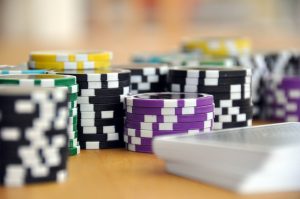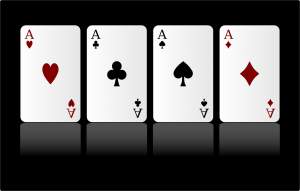 So, how do you escape this cycle of losses, tilting, and even greater losses rato, if you have already fallen into the “poker hell”? Of course, start playing well, but because you are in “poker hell,” your inner self just projects bad play, and your winrate becomes depressing. Moreover, you should become better than your best self because all positive variance is outweighed by the negative. So, it would be more valuable to ask how we can neutralize the negative effects of “poker hell” to transition to an upswing more quickly and easily?
So, how do you escape this cycle of losses, tilting, and even greater losses rato, if you have already fallen into the “poker hell”? Of course, start playing well, but because you are in “poker hell,” your inner self just projects bad play, and your winrate becomes depressing. Moreover, you should become better than your best self because all positive variance is outweighed by the negative. So, it would be more valuable to ask how we can neutralize the negative effects of “poker hell” to transition to an upswing more quickly and easily?
To answer this question, let's step back a bit and analyze the composite mental processes that occur during a downswing. There are two main negative consequences: the first type – short-term negative associations and the second type – the collapse of self-perception.
First, let's examine short-term negative associations. A downswing is a period during which you repeatedly receive negative feedback, regardless of your actions. You will learn, at least in the short term, some things that are not true, simply because they left a deep impression on your consciousness, e.g., “aces never win” or “my bluffs never work.” A downswing is a significant deviation from well-calibrated feedback (which would appear as a reward for correct behavior and as a punishment for incorrect behavior). The result of all this is that your feelings are significantly misled and unbalanced. This is how short-term negative associations work.
For example, a very common thing that players learn during a downswing is that “opponents always have the nuts” or that “I never win with x hand or in y situation” or even more foolish beliefs like “I always lose flips.” Of course, if a person is not in a downswing, such statements seem at least silly. However, for someone in a downswing, these beliefs are a product of their conditioning. They learned these things from the feedback poker gave them. Simply through trial and error. And frankly, such a thought is not foolish; it is what their subconscious learned, which constantly receives information and responds to the most recent feedback.
Due to the subconscious's ability to quickly adapt to new information and dynamically change, a player often “feels” many things as truth, even though someone not in a downswing knows they are not true. Even if the rational mind knows that, objectively speaking, it is not true that a player in a downswing never wins flips, they still cannot resist the subconscious warnings. You have surely experienced this. It is difficult to help such a player because they feel they will lose every flip. This, in turn, affects their expectations, behavior, and emotional response.
Behavior caused by a downswing is largely an attempt to avoid risk. Downswings make players stop making high-variance bluffs; they stop being creative and experimenting. Downswings make players prefer low-risk situations and try to avoid situations where they might make mistakes.
In animal psychology, such behavior is called “learned helplessness.” In one (very old) experiment, researchers took a dog and placed it on an electrified mat that occasionally delivered electric shocks. Although the dog initially tried to escape for its safety, it eventually realized it could not escape the mat. Ultimately, the dog reached a state of depression. It lay down, stopped expending energy, and simply accepted the pain it received. The dog learned that it was helpless and that there was no point in wasting energy or taking risks. In a downswing, we experience almost the same thing. Because the subconscious learns that “nothing works,” you stop trying to outplay opponents or take risks and simply hope to wait for good variance or for the suffering to end. Striving to dominate your opponents is an integral part of good poker, and it is the first step to getting out of a downswing. This is somewhat problematic. What can be done to make it easier?
Some believe that this problem is difficult to manage. You cannot protect your subconscious from learned short-term patterns – it absorbs everything too much. The mental distortions caused by a downswing are also inevitable, and no functioning human mind can escape them. This is simply our fate as poker players. However, although we cannot completely get rid of it, there are some things we can do to mitigate these phenomena.
First, win. It sounds very simple, but it is very important. As soon as you start winning, your subconscious will get rid of all negative associations. But when you are in a downswing, you might start thinking that you have no control over your wins or losses. So, there are some tricks that can help your winrate move forward more.
First, move down. Do not hesitate just because your bankroll is large. If you play $2/$4 and are going through a strong downswing, a week at the $.50/$1.00 limits will do you a lot of good – you will feel capable of winning, feel a sense of control and mastery over your opponents, and thus many negative mental distortions will straighten out.
Second, you need to force yourself to start making more creative and risky actions so that  you can reprogram yourself into a broader range of possible actions. A downswing naturally clips the wings of creativity because creativity is constantly punished. Playing at lower limits will make it easier to perform more creative actions with smaller amounts, and forcing yourself to perform more complex actions will eliminate the short-term conditioning that has arisen.
you can reprogram yourself into a broader range of possible actions. A downswing naturally clips the wings of creativity because creativity is constantly punished. Playing at lower limits will make it easier to perform more creative actions with smaller amounts, and forcing yourself to perform more complex actions will eliminate the short-term conditioning that has arisen.
Third, what you can do is be more selective about who you play with. Although this seems obvious, it is worth emphasizing because it is often forgotten. This will also have an impact on raising your winrate.
And finally, you should shift your focus from results to the process. This is a somewhat abstract statement, so let's explain it in more detail. Poker naturally rewards and punishes us by allowing us to win or lose pots. However, if you are simply punished and rewarded by playing well and making good decisions, rather than winning or losing pots, it certainly alleviates many of the negative consequences we are now talking about. This is exactly what shifting focus to the process helps us with. When you are process-oriented, even if you are in a downswing, your confidence will be based on whether you made a good decision, regardless of whether you lost the pot. If you were result-oriented, a bad period would cause negative self-perception, even when making correct decisions. Being focused on results makes you experience a higher degree of variance at the mental level. A correct decision will always be a correct decision, but it will not always end with winning the pot.





